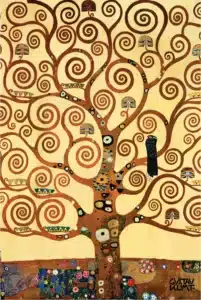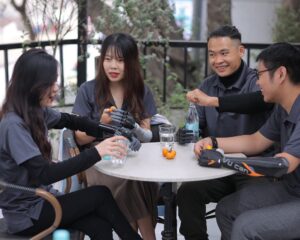I don’t remember the moment I identified as being a feminist. Rather, I have gradually become more aware of the power structures around me and ways I’m excluded from institutional authority. Over time, I have become better at noticing the ways I’m included that I have taken for granted, when others are excluded. This intersectional awakening has included aspects of class, race, education, age, sexuality, ability/illness and religion as well as gender.
When I was 10 years old, I insisted that mum not sit me at the children’s table at Christmastime. I knew what kinds of conversations I wanted to participate in, and I wanted to be considered fully a person, not someone to be placated with boring food and distracted with silly games. I wanted – and I was sure I could handle – what I saw as the full experience.
Thankfully, my mother took my righteous indignation in stride, and made sure there was room for me among the adults, and I definitely made many intelligent contributions to the grown-up discussion.
I haven’t become less sensitive over time to the feeling that my priorities are being dismissed, and so I’ve tried to make sure to always respect the personhood of the children around me. That empathy grew from an experience that personally affected me, so it’s easy to remember to treat others with the kindness I would have liked.
There are many kinds of privilege, though, that I haven’t noticed I held. That’s kind of the way of privilege. It’s much harder to hold open spaces for the desires and priorities of others when I can’t imagine what they’d like, and I can’t see what they don’t have.
I now live in Germany, and (as far as Duolingo is concerned) I’m 27% fluent in the language, but I’m pretty sure I’m about to get a crash course in the kinds of privilege I’ve held for the last 29 years as someone who spoke the official, majority language of the countries I lived in. I’d be lying if I said I was looking forward to it – or even that I wouldn’t change it if I could take a magic pill. Indeed, I’m in the position to be able to study German full-time at the nearby university, which many refugees or stay-at-home-carers (among others) don’t, and I’ll learn as much and as quickly as I can.
It makes me sad that I needed personal experience to stretch my imagination enough to build that empathy. I had just assumed that of course people who need translators would easily be able to find and afford one, and be comfortable relaying sometimes sensitive information through an unknown person. Facing the possibility of needing to visit a doctor who might not be able to communicate with me directly, I wondered about how many non-English-speaking immigrants to Australia would put off medical care out of embarrassment, lack of familiarity with available translation resources, and even realised I assumed it would be a free service.
I wish I was better at seeing the ways all these kinds of privilege (and lack thereof) affect my interactions with others, and I hope that this stretching experience will help me be more mindful of those whose lives are outside the very restricted framing of “normal” in mainstream culture.
Isaiah 3 – important enough to repeat in 2 Nephi 13 – warns us against oppression, and begs us to not grind the faces of the poor. As someone who grew up identifying as poor (though able to pass for middle-class, so accruing much of that privilege), I thought this verse was about other people, but the more I experience, and the more I learn about the experiences of others, the clearer it becomes that “poor” in this verse doesn’t only (or even mostly) refer to money. It’s calling us to give up power that creates disparity between any of God’s children. That’s not going to be easy or simple, but it is something that I can focus on, and ask “Lord, is it I?”







6 Responses
Brilliant, Olea. I’ve been struggling with similar thoughts of my own. I admire your bravery in expressing these ideas here.
Thank you, spunky 🙂
This is gorgeous, Olea, and I love how you’ve incorporated the Isaiah scripture. Recognizing these power structures and how they benefit us (and oppress others) is hard but necessary work, and I’m just starting to realize how much work I have to do.
Thanks, Liz – I’m learning to redirect my frustration that others don’t see my lack of opportunity into reminders to look around for others who might have even less than me. When I can find ways to include others, my faith in humanity increases, and my patience with others (and myself) grows, and I feel more hopeful that we can do that hard but necessary work together.
Very well written post. Thoroughly enjoyed it.
Thank you, EFH!